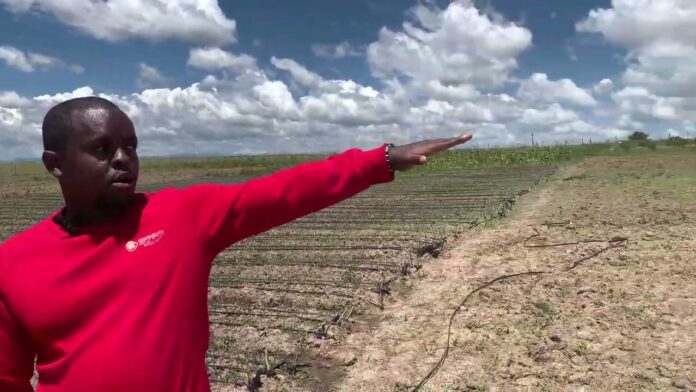Despite studying Mechatronics engineering, Edwin Mwangi Mbiyu has embraced horticulture and is making a fortune from growing onions.
On his farm in the Milimani area in Chaka, Nyeri county, Mwangi grows cabbages and onions under irrigation.
He grows the Africa Red onion variety because it is of good quality and affordable price compared to other varieties. He notes that the variety is harvested three months after planting.
He explains that he first prepares seeds on a nursery bed before transplanting the seedlings.
“The beds need to be raised and the reason for raising the beds is to prevent water from washing away the seeds. Once you plant them into the nursery bed, they should be well spaced from each other. You can use manure to cover the seeds or you can mix the manure with the top soil then you cover the seeds with it,” he says.
On the farm, Mwangi uses drip irrigation and has embraced mulching to conserve moisture as well as control weeds. He uses natural weeding methods, which makes his produce free from harmful chemicals.
Why Staying In The Same Job For More Than 5 Years Is A Bad Idea
The 26-year-old says that one of the biggest challenges is pests, naming thrip as the most destructive pest in onion farming.
On fertilization, Mwangi says that when transplanting onions, a farmer should start with DAP fertilizer adding that a 50kg bag is enough for one acre.
“You then apply fine manure. Don’t pour Big Blocks of manure because it may inhibit the seedlings from growing. Once you’ve done the transplanting, you’ll be pouring water about 3 times a week then through visual inspection you should be checking the beds as you regulate the weeds,” he adds.
According to the farmer, after weeding, a mixture of NPK and CAN fertilizer should be added to allow the seedling to absorb the fertilizer freely.
He adds that the onions are ready for harvesting after three months when the bulbs bulge out.
“When the onions are ready, the leaflets get dried up. the reason they dry up is so that the water from the leaflets can come down to the bulb so that it can properly mature and bulge,” he explains.
He adds that different clients prefer different onion sizes, a market factor that farmers should consider before venturing into onion farming.
According to him, the medium-sized onions are the most preferred in the retail market due to the high demand, while large onions are the most preferred by hotels.
The farmer advises people intending to venture into onion farming to go for it adding that the venture is like a gamble due to the unpredictable market.
“I want to tell people out there that there’s no best season to plant onions coz it’s more of gambling. Just gamble the season; one time you plant the onions, the prices are favorable the other time the prices are poor. So yeah, I don’t think there’s anything like a good season to plant onions,” he says.
Mwangi sells his produce locally mainly to hotels as well as retailers. He notes that from an acre, he harvests between 10,000 to 12,000 kilos depending on how big the onions are.









